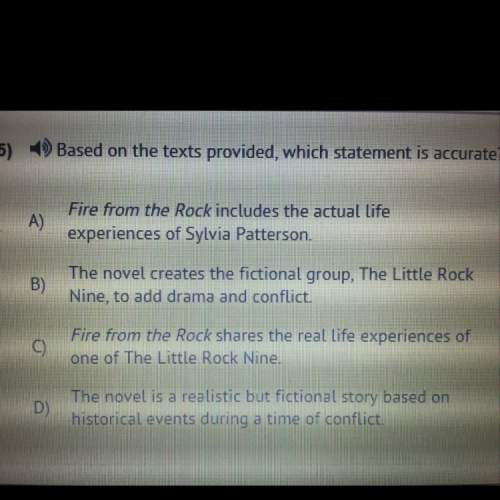
English, 25.09.2020 08:01, alejandra216
Review the lines from Act II, scene ii of Romeo and Juliet. Juliet: ’Tis but thy name that is my enemy; Thou art thyself though, not a Montague. What’s Montague? It is nor hand, nor foot, Nor arm, nor face, nor any other part Belonging to a man. O! be some other name: What’s in a name? that which we call a rose By any other name would smell as sweet; The purpose of this speech is to illustrate Juliet’s love for Romeo in spite of his family name. concern that Romeo is her sworn enemy. wish that Romeo belonged to another family. fear that Romeo may be physically harmed.

Answers: 2
Other questions on the subject: English

English, 21.06.2019 18:40, levelebeasley1
Which lines foreshadow macbeths eventual killing of the king
Answers: 2

English, 21.06.2019 20:30, hannahhh565
Which best defines a literary stereotype and its purpose in literary? a- a literary stereotype is a term used interchangeably with prejudice. b- a literary stereotypes creates conflict and contrast how a character may seem with who a character really is. c- a literary stereotypes has no purpose in literary in literary expect to reveal prejudice and express the views of an antagonist. d- a literary stereotype is a way for the writer to indicate whether a character is good or evil, a protagonist or an antagonist.
Answers: 3

English, 22.06.2019 01:00, evsdcp44b3w
Read the quotation from "an occurrence at owl creek bridge." and now he became conscious of a new disturbance. striking through the thought of his dear ones was a sound which he could neither ignore nor understand, a sharp, distinct, metallic percussion like the stroke of a blacksmith’s hammer upon the anvil; it had the same ringing quality. he wondered what it was, and whether immeasurably distant or near by—it seemed both. its recurrence was regular, but as slow as the tolling of a death knell. he awaited each stroke with impatience and—he knew not why—apprehension. the intervals of silence grew progressively longer, the delays became maddening. with their greater infrequency the sounds increased in strength and sharpness. they hurt his ear like the thrust of a knife; he feared he would shriek. what he heard was the ticking of his watch. which best describes the effect of the narration in the excerpt? it suggests that the man being executed feels tranquil and at peace. it suggests that the narrator is sympathetic to the man being executed. it suggests that the plot will become less tense as the story continues. it suggests that the story will become more intense and mysterious.
Answers: 1

English, 22.06.2019 01:00, COOLIOMARIS
Select the quote that best shows character. “why should he disturb my peace? ” “excuse me, sir, i am not accustomed to listen to such expressions or to such a tone of voice. i want to hear no more.” “the dear lady may well have taken me for a brigand.” “then you won’t pay me now? eh? ”
Answers: 3
Do you know the correct answer?
Review the lines from Act II, scene ii of Romeo and Juliet. Juliet: ’Tis but thy name that is my ene...
Questions in other subjects:



English, 27.09.2021 18:40



Chemistry, 27.09.2021 18:40

History, 27.09.2021 18:40


English, 27.09.2021 18:40

Mathematics, 27.09.2021 18:40







